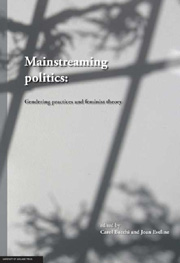Book contents
- Frontmatter
- Contents
- Preface
- Personal reflection
- Publisher's note
- List of authors and project personnel
- Acknowledgements
- Introduction
- 1 Gender/ing impact assessment: Can it be made to work?
- 2 Mainstreaming and neoliberalism: A contested relationship
- 3 Gender analysis and social change: Testing the water
- 4 What are we mainstreaming when we mainstream gender?
- 5 Approaches to gender mainstreaming: What's the problem represented to be?
- 6 Power, resistance and reflexive practice
- 7 Gender mainstreaming: The answer to the gender pay gap?
- 8 Gender analysis and community participation: The role of women's policy units
- 9 The invisibility of gendered power relations in domestic violence policy
- 10 Gender mainstreaming versus diversity mainstreaming: Methodology as emancipatory politics
- 11 University-public sector research collaboration: Mine the space, never mind the gap
- 12 Obeying organisational ‘rules of relevance’: Gender analysis of policy
- 13 Gender mainstreaming or diversity mainstreaming? The politics of ‘doing’
- Conclusion A politics of movement
- Author Index
- General Index
3 - Gender analysis and social change: Testing the water
Published online by Cambridge University Press: 05 June 2012
- Frontmatter
- Contents
- Preface
- Personal reflection
- Publisher's note
- List of authors and project personnel
- Acknowledgements
- Introduction
- 1 Gender/ing impact assessment: Can it be made to work?
- 2 Mainstreaming and neoliberalism: A contested relationship
- 3 Gender analysis and social change: Testing the water
- 4 What are we mainstreaming when we mainstream gender?
- 5 Approaches to gender mainstreaming: What's the problem represented to be?
- 6 Power, resistance and reflexive practice
- 7 Gender mainstreaming: The answer to the gender pay gap?
- 8 Gender analysis and community participation: The role of women's policy units
- 9 The invisibility of gendered power relations in domestic violence policy
- 10 Gender mainstreaming versus diversity mainstreaming: Methodology as emancipatory politics
- 11 University-public sector research collaboration: Mine the space, never mind the gap
- 12 Obeying organisational ‘rules of relevance’: Gender analysis of policy
- 13 Gender mainstreaming or diversity mainstreaming? The politics of ‘doing’
- Conclusion A politics of movement
- Author Index
- General Index
Summary
Introduction: Carol Bacchi and Joan Eveline
The title to this chapter indicates the major goal of the Gender Analysis Project: to identify the factors that could create gender analysis as a long-term process of emergent changes to the asymmetrical power relations between women and men. The sub-title, ‘testing the water’, indicates that it was written in the early stages of the project. However, it is important to note that the papers are not strictly chronological in their production. The Chief Investigators (Bacchi and Eveline) took turns as ‘lead authors’ and Chapter 4, with Eveline the lead author, was actually completed before this chapter, with Bacchi the chief author. Insights from Chapter 4 are therefore incorporated in this chapter. The resultant analysis represents a cross-fertilisation of ideas, as is the nature of collaboration.
The chapter emphasises the importance of involving policy workers actively in practising gender analysis (that is, in applying gender analysis guidelines), a significant learning outcome for the project (Chapter 12). We also suggest that it is useful to conceptualise and to talk about social change in a different way, as the unpredictable effect of complex and continuous processes, occurring ‘somewhere in the middle’ and therefore always involving ‘unfinished business’ (see Introduction; see also the discussion of the ‘rhizomatic’ in Chapter 6). This approach directs attention to the everyday work practices that reproduce gendering as an always- incomplete relation of inequality.
- Type
- Chapter
- Information
- Mainstreaming PoliticsGendering Practices and Feminist Theory, pp. 61 - 86Publisher: The University of Adelaide PressPrint publication year: 2010

